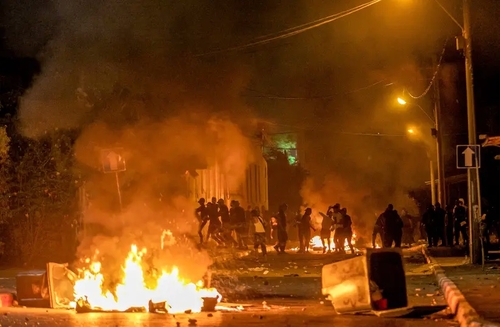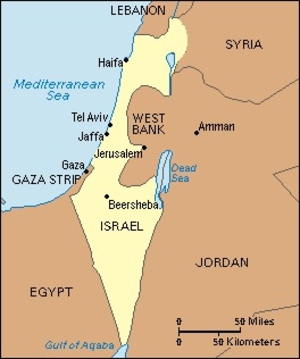Global Review: What do you see as the most important causes of the recent conflict between Hamas and Israel; and why did it take place just now?
 The Sheikh Jarrah district of Jerusalem, scene of a real estate dispute. |
GR: Hamas did indeed win popularity in the West Bank at the expense of the Palestinian Authority headed by Abbas; does this mean it might take power there and complete the ring of fire against Israel?
DP: No: the Israeli government will do all it can to prevent Hamas from taking power in the West Bank. That should suffice to keep it out.
GR: Do you agree with those who say that Israel won the war militarily and Hamas won it politically?
DP: Partially. Israel's military success is unarguable. The political battlefield is much less clear. But the most important question is whether this fourth round of fighting will lead Israelis to make sure there is no fifth round. I think that is likely, in which case Hamas would be the big loser.
GR: This was the first time Hamas managed to incite the Israeli Arabs. What does this mean for Israel?
DP: In all, I see this as positive for Israel because it wakes the Jewish citizens to the pending crisis on their hands with their Muslim compatriots, something I have long predicted but which they have been unwilling to confront.
 Ramla on fire, May 10, 2021. |
GR: The Right in Israel says that the previous blockade of Gaza was too lax and needs tightening. The Left says that Israel should win over the Gazan people by improving their lives, leading to a revolt and the overthrow of Hamas. Which of these, or some other option, do you favor?
DP: I favor the Right's view. The Left's view was tried in 1993; it's called the Oslo Accords and it failed dismally. Palestinians have a full century's record of caring far more to pursue their anti-Zionist passions than to improve their own lives. They constitute the most radicalized population on earth.
GR: Hamas explicitly seeks to eliminate the Jewish state, but how can it do this? Military conquest appears illusionary. Is the goal to terrorize Israel, ignite conflicts between Israeli Jews and Arabs, terminate foreign investment, demoralize Israeli Jews, and make them flee Israel?
DP: Yes, that is precisely the goal, harassing Jewish Israelis to the point that they abandon the country. Unfortunately for Hamas, this tactic has completely failed, what with Israelis scoring very high on happiness rankings, enjoying a developed economy, the rule of law, democracy, and a high level of personal security. Hamas, in its fanaticism, seems unaware of this situation and keeps using the same, futile and abominable methods.
GR: Most outside powers support a two-state solution, as do the Israeli Left and the PA; does it still have relevance when neither the Israeli Right nor Hamas want it?
DP: In the short term, no, the two-state solution has no relevance for the reasons you state: most Israelis fear it and most Palestinians want to eliminate Israel. But in the long term, the two-state solution continues to offer the only potentially satisfactory resolution of one of the globe's most intractable conflicts. When Palestinians suffer defeat and no longer believe they can eliminate the Jewish state of Israel, then the prospect opens for a two-state solution. But that is many years or decades away.
 The map during 1949-67, when Egypt controlled Gaza and Jordan the West Bank. |
DP: Those are, exactly, the short-term alternatives. Personally, I prefer the Egypt-and-Jordan option.
GR: The number of Israelis living in the West Bank has grown to 450,000. Do they obstruct a two-state solution?
DP: Not at all, assuming that Jews can live in a Palestinian state just as Palestinians live in the Jewish state. Such an assumption is imperative; to expect otherwise – that close to a half-million Israelis must pack up and leave the West Bank – implies that Jews have not yet been accepted, in which case the conflict continues.
GR: Are demands for sanctions against Israel to stop its settlements in the West Bank inherently antisemitic?
DP: Yes, of course, given that those making such demands do not make similar demands on Morocco in Western Sahara, Turkey in northern Cyprus, or China in Tibet and East Turkestan.
GR: Please explain the concept of Israel Victory that you originated and the Middle East Forum promotes.
DP: Wars end when one side gives up; for the Palestinian-Israeli conflict to end, Israel needs to pursue policies that convince Palestinians their goals are hopeless. Doing so will obviously benefit Israelis but even more Palestinians, who can finally begin to build their polity, economy, society, and culture.
May 27, 2021 addendum: Israel's military has lower standards of victory than I do. The Times of Israel reports today that Maj. Gen. Aharon Haliva, the head of IDF Operations, has said the conflict "would be considered a success for Israel if it brought about five years of calm in Gaza."
